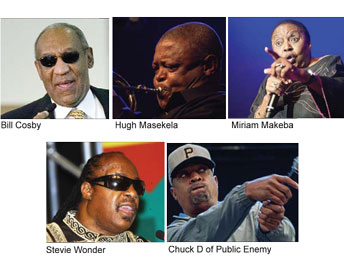Mandela, apartheid and cultural revolution
By Starla Muhammad -Assistant Editor- | Last updated: Dec 11, 2013 - 10:38:19 AMWhat's your opinion on this article?
|
|
“...Nelson Mandela is a man I consider to be true blue,
Long live the ANC, Walter Sisulu”
Chubb Rock, “The Chubbster”-1991
“The wretchedness of Satan’s wrath, Will come to seize you at last,
‘cause even he frowns upon the deeds you are doing,
And you know deep in your heart,
You’ve no covenant with God
‘cause he would never countenance people abusing”
Stevie Wonder, “It’s Wrong (Apartheid)-1985

|
NEWS ANALYSIS
While powers in the U.S., Great Britain, other European powers and Israel remained silent and corporations continued investing and doing business with the African nation, singers, actors, musicians, hip hop artists and others did not sit idly by.
The injustices of South Africa’s apartheid-era regime propelled artists in music and entertainment to speak out against the racist government through various art forms, from the late 1940s through the early 1990s. Many well-known Black artists took a very active and vocal role in the anti-apartheid movement.
In the mid-1960s, a group of 65 artists, the majority of them Black including, Harry Belafonte, Sammy Davis Jr. and Nina Simone refused to perform in South Africa in protest. They took a stand of principle over profit.
Stevie Wonder, Roberta Flack, and Mr. Belafonte, penned individual songs or collaborated with other musicians releasing anti-apartheid anthems. “Tutu” by jazz great Miles Davis, “Bring him back home” by Hugh Masekela of South Africa, “Mandela” by Youssou N’Dour of Senegal, and “Fire in Soweto” by reggae singer Sonny Okosun were as inspirational as they were compelling. Mr. Belafonte was an outspoken critic of apartheid dating back to the 1950s and in 1985 was arrested at an anti-apartheid rally in Washington, D.C. near the South African Embassy. His music was banned in South Africa because of his vocal criticism of the South African government.
There was growing pressure by entertainers along with a bustling grassroots movement of student activists in the U.S. and abroad for corporations to divest from doing business in South Africa.
Black entertainers also participated in the Artists United Against Apartheid movement of the 1980s and ‘90s including rap pioneers Grandmaster Melle Mel, Afrika Bambaataa, Kurtis Blow, Run-DMC, soul legends David Ruffin and Eddie Kendricks of the Temptations, Bobby Womack, Gil-Scott Heron, Jimi Cliff and Nona Hendryx. Public Enemy and Stetsasonic incorporated the mass anti-apartheid message in their music.
Black actors also lent their voices of dissent in a different way. At the height of its popularity, The Cosby Show was the highest rated sitcom on American television. Famed South African singer and anti-apartheid activist the late Miriam Makeba made an appearance on the show in 1991. The apartheid regime revoked her passport and citizenship in the early 1960s.
When the twin grandchildren of characters Claire and Cliff Huxtable were born, they were named Nelson and Winnie, after Mr. Mandela and his then wife. An anti-apartheid poster could be seen mounted on the bedroom door of the sitcom couple’s teenage son Theo.
A Different World, a spin-off of the Cosby show took place at a historically Black college. Produced and directed by Debbie Allen, one episode featured students preparing for an anti-apartheid protest as another student agonized whether to accept a scholarship from a company that refused to divest. Both shows proved Black sitcoms could be both entertaining and enlightening.
In film, director Spike Lee made mention of divesting in his 1989 movie, “School Daze” and after Mr. Mandela’s release from prison, the late South African president appeared at the end of his movie “Malcolm X.”
Other movies that brought aspects, albeit a watered down glimpse of apartheid to the big screen included, “Cry Freedom” starring Denzel Washington, about murdered South African freedom fighter Steve Biko and “Sarafina”, a musical starring Whoopi Goldberg.
Tributes and condolences from around the world were still pouring in as preparations for the memorial honoring Mr. Mandela were planned.
Mr. Belafonte in reflecting on the life of Mr. Mandela said via Twitter, “His wisdom and goodness were the brightest stars in our moral galaxy. His courage inspired all who struggled for justice. His vision gave sight to those who otherwise might have been blinded by hate. His truth will live forever.”
Mr. Belafonte and Black entertainers that chose to not remain silent could be a big reason why.
INSIDE STORIES AND REVIEWS
-
-
About Harriett ... and the Negro Hollywood Road Show
By Rabiah Muhammad, Guest Columnist » Full Story -
Skepticism greets Jay-Z, NFL talk of inspiring change
By Bryan 18X Crawford and Richard B. Muhammad The Final Call Newspaper @TheFinalCall » Full Story -
The painful problem of Black girls and suicide
By Charlene Muhammad -National Correspondent- » Full Story -
Exploitation of Innocence - Report: Perceptions, policies hurting Black girls
By Charlene Muhammad -National Correspondent- » Full Story -
Big Ballin: Big ideas fuel a father’s Big Baller Brand and brash business sense
By Bryan Crawford -Contributing Writer- » Full Story






 Click Here Stay Connected!
Click Here Stay Connected!








